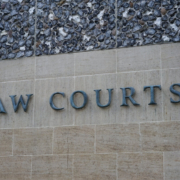Estate Planning in a COVID-19 World
In a span of just a month or so, the coronavirus pandemic has turned our country and most of the world upside down. Hundreds of thousands of Americans have tested positive for COVID-19, and because we are short on tests in many parts of the country, the real number of people who have had it probably totals well into the millions. We have already lost tens of thousands of our citizens to this virus, and no one is entirely sure when this pandemic is going to be over.
One of the most important things that the COVID-19 outbreak has done is to remind us of our own mortality. People are dying from the coronavirus every day, and it is not only the elderly and infirmed. Fatalities are happening among middle-aged individuals and even some younger adults that many never thought could succumb to the disease.
The fact that the coronavirus can be deadly should not cause us to live in fear. It should, however, prompt us to get our affairs in order, so we are fully prepared to pass our property on to the next generation and have our final wishes carried out whenever it is our time to leave this earth. We should also make sure we have a plan in place in the event that we ever become physically or mentally incapacitated and unable to manage our own affairs.
Foundational Estate Planning Documents to Consider
Everyone’s situation is unique, so each estate plan should be tailored to fit your specific needs. That said, there are several estate planning documents that would be considered essential for many individuals:
- Last Will and Testament: Having a will is a necessity for just about everyone, regardless of their circumstances. Without it, your loved ones could be facing a long and drawn out probate process after you pass on, with the courts having the final say on how your estate is distributed and who becomes guardian of any minor children you may have. With a last will and testament, all of your final wishes are spelled out for you, and you are able to appoint an executor (someone you fully trust) to carry out your directives. This helps ensure that probate goes smoothly and the chances of conflict among family members are minimal.
- Advance Health Care Directive: Also referred to as a living will, an advance health care directive is a document that spells out how healthcare should be administered to you under various scenarios should you be unable to make these decisions at the time. For example, you can decide which procedures you would like to have and which ones to forgo, end-of-life pain relief decisions, and many others. This document should also appoint a health care agent/health care power of attorney, which again should be someone you fully trust to see to it that your wishes regarding health care decisions are carried out.
- Financial Power of Attorney: In addition to a healthcare power of attorney, you should also appoint a financial power of attorney to make financial decisions on your behalf should you become unable to do so yourself. A financial power of attorney would be authorized to manage your bank account, pay bills, manage business affairs, and make any other decisions related to your finances. Once again, make sure this is someone you are absolutely certain you can trust in this area.
- Revocable Living Trust: A revocable living trust is a slightly more advanced estate planning document that creates a separate entity in which you can hold your assets. Any property you place into your trust can be distributed directly to your designated beneficiaries when you pass on, thus bypassing the need for probate. Having a trust also ensures privacy – since it does not go through probate, it does not become part of the court record.
Contact Garmo & Garmo for All Your Estate Planning Needs
Estate planning is not just for the affluent, and the coronavirus outbreak has reminded us that it is necessary at any age. At Garmo & Garmo, we have extensive experience helping clients in Southern California with all types of estate plans – from the simplest to the most complex. We also want you to know that we are open and fully operational even as our state and nation deals with the COVID-19 pandemic. We are doing most of our work remotely as we follow all of the social distancing guidelines, but we have the technology and resources to handle whatever legal needs you may have.
To get in touch with a member of our legal team, message us online or call us today at (619) 441-2500. We look forward to serving you!












